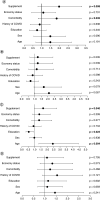Societal influence and psychological distress among Indonesian adults in Java on the early Omicron wave of COVID-19
- PMID: 37753359
- PMCID: PMC10518838
- DOI: 10.2144/fsoa-2023-0104
Societal influence and psychological distress among Indonesian adults in Java on the early Omicron wave of COVID-19
Abstract
Aim: Changes during the COVID-19 pandemic might create pressure on different people, thus this study aimed to measure respondents' psychological distress during the early phase of the Omicron wave in Java Island.
Methods: A web-based survey on societal influence and COVID-19-related psychological distress was distributed through social media in November-December 2021, and received 396 responses.
Results: This study showed that almost 50% of respondents faced psychological distress during the early phase of the Omicron variant, especially concerning hypervigilance and avoidance. Several sociodemographic factors might contribute to the incidence of psychological distress including comorbidity, age and education.
Conclusion: Taken together, the incidence of COVID-19-related psychological distress was still found in the early phase of the Omicron variant, especially among young adults.
Keywords: anxiety; desirability; distance; information; mental health.
Plain language summary
The COVID-19 pandemic hits every aspect of human life, including the social and psychological aspects. This study was conducted to measure these changes in Indonesian adults who stayed on Java Island during the early phase of the Omicron wave. Using an online questionnaire, 396 responses were received and analyzed. The results showed that almost half of the respondents still had symptoms of psychological distress. Several sociodemographic factors might contribute to the incidence of psychological distress including comorbidity, age, and education. Understanding these factors might bring benefits for future pandemic preparedness.
© 2023 The Authors.
Conflict of interest statement
The authors have no other relevant affiliations or financial involvement with any organization or entity with a financial interest in or financial conflict with the subject matter or materials discussed in the manuscript apart from those disclosed.
Figures


Similar articles
-
Psychological responses, mental health, and sense of agency for the dual challenges of climate change and the COVID-19 pandemic in young people in the UK: an online survey study.Lancet Planet Health. 2022 Sep;6(9):e726-e738. doi: 10.1016/S2542-5196(22)00172-3. Lancet Planet Health. 2022. PMID: 36087603 Free PMC article.
-
Demographics Associated With Stress, Severe Mental Distress, and Anxiety Symptoms During the COVID-19 Pandemic in Japan: Nationwide Cross-sectional Web-Based Survey.JMIR Public Health Surveill. 2021 Nov 22;7(11):e29970. doi: 10.2196/29970. JMIR Public Health Surveill. 2021. PMID: 34653018 Free PMC article.
-
Depression, Anxiety, Stress, and Suicidality Levels in Young Adults Increased Two Years into the COVID-19 Pandemic.Int J Environ Res Public Health. 2022 Dec 26;20(1):339. doi: 10.3390/ijerph20010339. Int J Environ Res Public Health. 2022. PMID: 36612666 Free PMC article.
-
Is It Just About Physical Health? An Online Cross-Sectional Study Exploring the Psychological Distress Among University Students in Jordan in the Midst of COVID-19 Pandemic.Front Psychol. 2020 Nov 6;11:562213. doi: 10.3389/fpsyg.2020.562213. eCollection 2020. Front Psychol. 2020. PMID: 33240151 Free PMC article.
-
Psychological distress associated with the COVID-19 pandemic and suppression measures during the first wave in Belgium.BMC Psychiatry. 2021 Feb 18;21(1):112. doi: 10.1186/s12888-021-03109-1. BMC Psychiatry. 2021. PMID: 33602149 Free PMC article.
References
-
- WHO. Weekly epidemiological update on COVID-19. https://www.who.int/publications/m/item/weekly-epidemiological-update-on... (2023).
-
- Worldometer. Coronavirus Cases Indonesia. https://www.worldometers.info/coronavirus/country/indonesia/ (2023).
LinkOut - more resources
Full Text Sources
